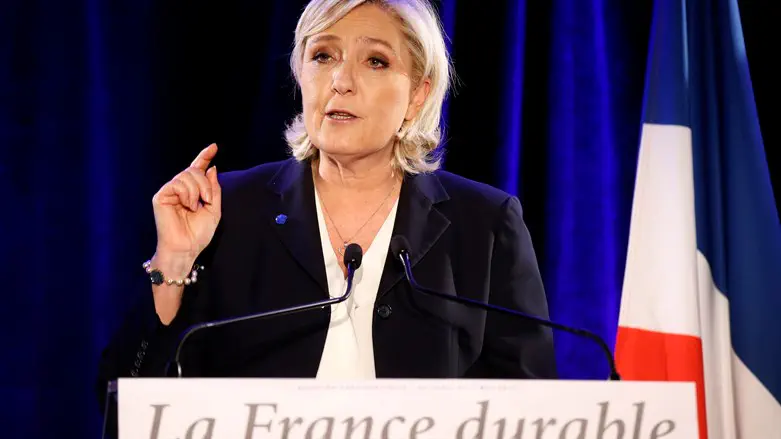
France is in the midst of an ideological struggle that could reshape the identity of its Republic. At the core of this struggle is the growing influence of Islamism—not as an external threat but as a domestic movement embedded in civic life—and the chilling treatment of those who speak out against it.
Marine Le Pen, president of the National Rally and one of the country’s most prominent opposition figures, has been convicted on charges relating to EU fund misuse. The sentence: four years in prison (two suspended), a €100,000 fine, and a five-year ban from holding public office. The timing is conspicuous. Just days before her sentencing, Le Pen called for an outright ban on the Muslim Brotherhood in France, citing national security concerns and intelligence reports alleging long-term “entryism” by the group.
Interior Minister Gérald Darmanin recently stated that “Islamism behaves today like fascism did yesterday.” He has promised to declassify documents showing how the Brotherhood is operating in France. Le Pen’s demands, while politically charged, echoed what France’s own intelligence services have already warned: the Brotherhood avoids violence but promotes ideological subversion of secular values.
This is not about banning Islam. It’s about recognizing political Islam—especially the Muslim Brotherhood—not as a religion, but as a calculated ideological project. According to territorial intelligence, the Brotherhood employs slow, nonviolent influence campaigns through community associations, student organizations, and religious networks. Its strategy is to normalize its values—anti-secular, theocratic, and patriarchal—by presenting itself as a voice of moderation. But its goal, according to internal reports, is to eventually impose Sharia-based norms in European democracies.
Le Pen’s call to ban the Brotherhood struck a nerve not because it was baseless, but because it was accurate and politically inconvenient. And whether one supports her or not, her immediate neutralization by the judiciary cannot be divorced from the political context. It sends a signal: speaking bluntly about Islamist ideology—especially when it touches powerful networks—is politically radioactive.
France has long prided itself on its laïcité, or secularism—a pillar of its national identity since the Revolution. But Islamism challenges this not with guns, but with lawsuits, influence campaigns, and the careful manipulation of democratic protections. It’s a modern Trojan horse. The Brotherhood frames itself as oppressed and marginalized while actively reshaping the institutions that give it cover. It weaponizes rights language to immunize itself from critique.
What’s worse, the French political class often recoils from confrontation, afraid of appearing discriminatory. The result is a vacuum of leadership, where only fringe voices dare to speak, and mainstream parties self-censor to avoid controversy. The threat grows not because France is too strong, but because it hesitates.
Le Pen’s ban is a strategic win for her opponents, but it leaves a vacuum in national debate. Agree with her or not, she forced uncomfortable conversations that no one else would. Her removal may create short-term calm, but long-term instability. Voters who fear Islamism will not disappear. If no one in mainstream politics addresses their concerns credibly, they will turn to more dangerous alternatives.
The state’s hesitation to act on its own intelligence, paired with its willingness to silence a political adversary raising those same concerns, raises questions about the health of democratic resilience. A confident democracy can confront ideas—even inflammatory ones—without jailing its opposition. By taking Le Pen off the field, the government has deprived voters of a choice—and that’s far more dangerous than anything she said about the Muslim Brotherhood.
The Brotherhood, meanwhile, continues its work quietly. It benefits from inaction. It builds networks, trains leaders, grooms youth, and gains legitimacy through institutions that have failed to vet it properly. Its success lies in its patience and its ability to make its critics look like the real problem. In a society where pointing out this dynamic risks public condemnation or prosecution, it thrives.
France is not alone in this. Every secular democracy must confront how to defend itself against ideological movements that use liberal norms as cover for illiberal ambitions. The Brotherhood is not unique in its method. What’s needed is policy, not panic—targeted bans, transparency, funding restrictions, and legal mechanisms that distinguish religion from ideology. France already has the legal tools. What it lacks is political courage.
Marine Le Pen is not a martyr. She’s a polarizing figure with a controversial history. But if she’s the only national politician willing to say what the Interior Minister admits behind closed doors, something is deeply broken. A functioning democracy must allow even distasteful voices to raise valid concerns. Silencing them doesn’t stop the problem—it only suppresses the warning signal.
